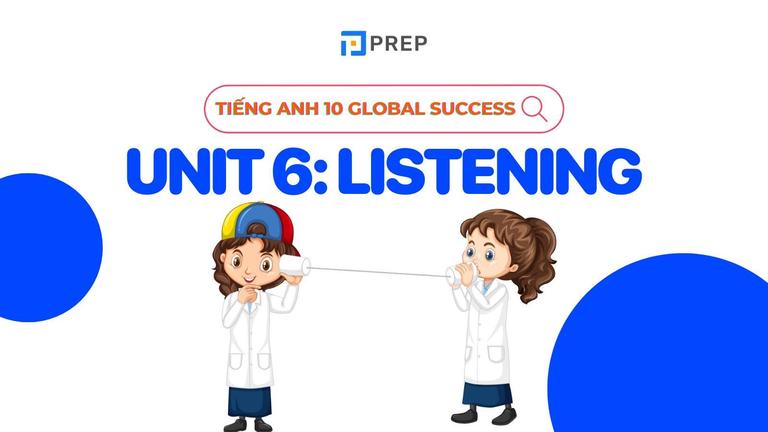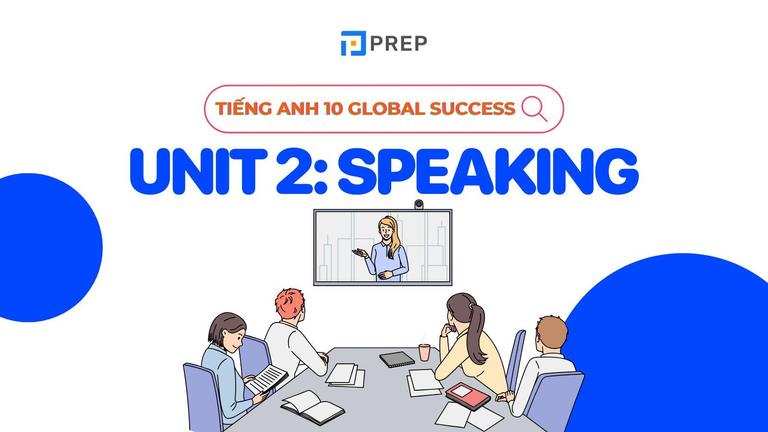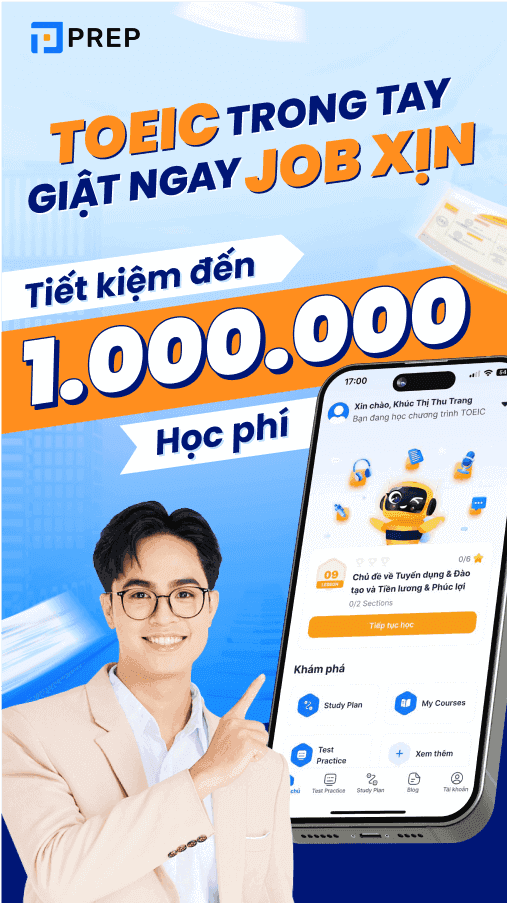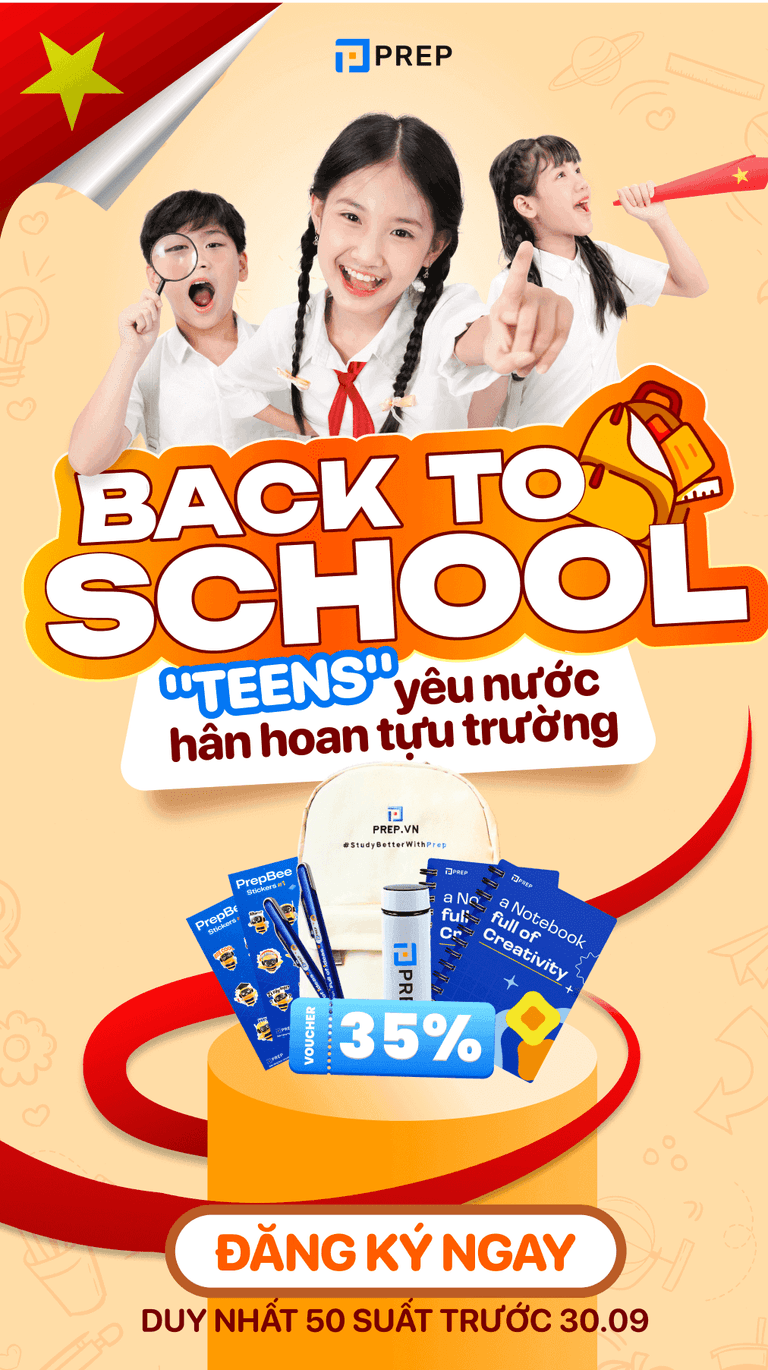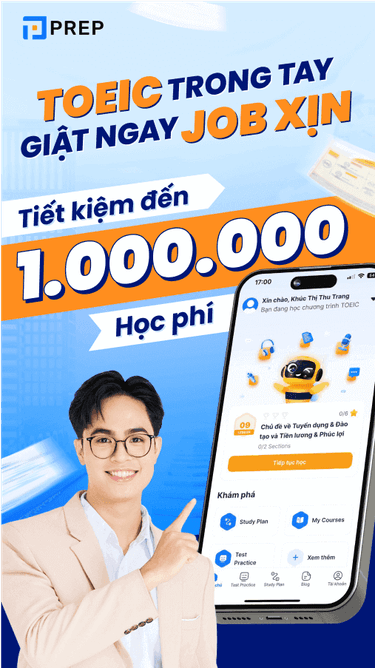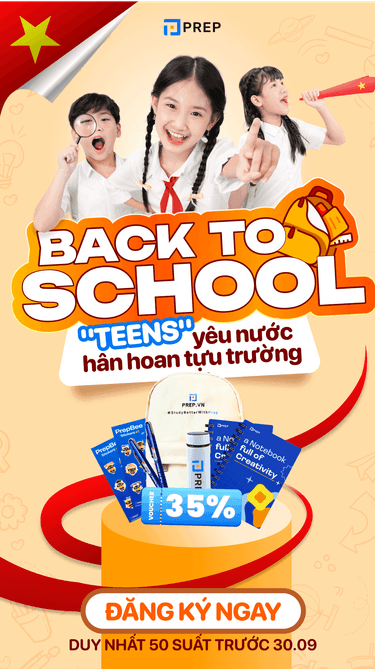Tổng hợp các bài nghe tiếng Anh lớp 11 hay kèm đáp án chi tiết
Hiểu được những khó khăn trong việc luyện nghe 11, PREP đã tổng hợp các bài nghe tiếng Anh lớp 11 theo chương trình sách giáo khoa Global Success. Tại đây, bạn sẽ tìm thấy đầy đủ các bài nghe theo từng Unit, đi kèm lời thoại (transcript), bản dịch và đáp án chi tiết. Bên cạnh đó, PREP cũng sẽ cung cấp những bài tập nghe có chủ đề liên quan đến chương trình học, giúp bạn nắm vững kiến thức. Cùng tìm hiểu nhé!
- I. Tổng hợp các bài nghe tiếng Anh lớp 11 Global Success
- 1. Unit 1 - A long and healthy life
- 2. Unit 2 - The Generation Gap
- 3. Unit 3 - Cities of the Future
- 4. Unit 4 - ASEAN and Viet Nam
- 5. Unit 5 - Global Warming
- 6. Unit 6 - Preserving Our Heritage
- 7. Unit 7 - Education options for school-leavers
- 8. Unit 8 - Becoming Independent
- 9. Unit 9 - Social issues
- 10. Unit 10 - The ecosystem
- 11. Review 1, 2, 3, 4
- II. Bài tập nghe tiếng Anh lớp 11 kèm đáp án

I. Tổng hợp các bài nghe tiếng Anh lớp 11 Global Success
Phần này được thiết kế để bạn ôn tập và củng cố kỹ năng nghe ngay sau khi học xong mỗi bài trên lớp. Hãy chọn Unit bạn muốn luyện tập trong bộ sưu tập những bài nghe tiếng anh lớp 11 này nhé!
1. Unit 1 - A long and healthy life
Trong bài nghe của chương trình tiếng Anh lớp 11 Unit 1 về một chương trình truyền hình liên quan đến thực phẩm và sức khỏe, bạn sẽ rèn luyện kỹ năng nghe chi tiết đồng thời ghi lại những ý chính quan trọng.
Audio Transcript:
TV host: Good evening! This is Oliver and this is 'Teen Life, where we answer questions from young people. This week we have received a lot of health questions, so today we have Katherine Jones, a food expert, to talk about healthy eating for teenagers and how food can affect their health. Welcome and thank you for joining us, Katherine.
Katherine Jones: Good evening, and thank you for inviting me. Well, when people want to improve their health and fitness, they often think of expensive health products and fitness programmes. But in fact, we can solve many of our health problems if we just eat healthily. For example, a lot of teenagers suffer from acne pimples or other skin issues, and often look for expensive skincare products. This is not necessary because they can simply change their diets for better skin. Food with a lot of sugar is not very good for your skin, so you should cut down on sugary desserts and drinks. By contrast, brown rice, yoghurt, watermelons, and green vegetables are great for healthy skin. Moreover, green vegetables can improve brain health and memory, and help teens concentrate better. Teenagers are still growing so they also need food for building strong bones and muscles. Research shows that eggs, fish, butter, carrots and sweet potatoes can help make them taller and stronger. Although food can't replace exercise, eating a balanced diet, supplying all the nutrients you need, will definitely help improve your muscle strength.
TV host: I guess 'you are what you eat' after all. Thank you, Katherine.

Xem chi tiết phần dịch nghĩa và đáp án bài nghe tại: Tiếng Anh 11 Unit 1 Listening.
2. Unit 2 - The Generation Gap
Một trong các bài nghe tiếng anh 11 hay mà bạn nên luyện tập đó là Unit 2 lớp 11. Chủ đề của bài nghe là cuộc trò chuyện giữa Kevin và Mai về các mâu thuẫn gia đình phổ biến mà thanh thiếu niên thường trải qua.
Audio Transcript:
Kevin: You look upset, Mai. What's the matter?
Mai: Well, it's my mum. She keeps complaining about my appearance.
Kevin: Oh, I'm sorry to hear that.
Mai: Yeah, she doesn't like my choice in clothes and hairstyle.
Kevin: I see. So what's wrong with your clothes and hair?
Mai: Nothing wrong. But my mum doesn't allow me to wear tight jeans to school. I'm not allowed to colour my hair either. She said she never wore tight clothes or coloured her hair when she was at school.
Kevin: Well, I think she's right. We have to wear uniforms to school, remember? And school rules don't allow coloured hair.
Mai: Yeah, I know. But I just want to look different on special occasions.
Kevin: Then you should tell your mum about it. I think she'll understand.
Mai: Maybe you're right. What about you, Kevin? Do you come into conflict with your parents?
Kevin: Not really. But they try to limit the time I spend on my smartphone and laptop. They don't really understand that I mainly use them for my homework, not to play games or post on social media.
Mai: Perhaps they worry about your eyesight.
Kevin: Yes, maybe that's why they take away my phone and laptop at 10p.m. Sometimes I don't even have time to complete my homework.
Mai: Why don't you try to write down your homework assignments on paper first, then you can type them quickly on your laptop?
Kevin: That's a good idea. I'll try to do that next time.
Xem chi tiết phần dịch nghĩa và đáp án bài nghe tại: Tiếng Anh 11 Unit 2 Listening.
3. Unit 3 - Cities of the Future
Ở phần Listening của Unit 3 tiếng Anh lớp 11, bạn sẽ nghe một buổi phỏng vấn bàn về mặt lợi và hạn chế của việc sống trong thành phố thông minh, từ đó luyện tập kỹ năng nghe hiểu và ghi chép ý chính.
Audio Transcript:
Host: Good morning. Welcome to our weekly programme Urban Lifestyle. In today’s programme, we’ll be talking about the disadvantages of living in a smart city. Joining me now in the studio is Ms. Stevens, a city dweller who has been living in a smart city for a year now. Good morning, Ms. Stevens.
Ms Stevens: Good morning.
Host: I understand that you don't like living in the smart city. Why is that? What are you worried about most?
Ms Stevens: Well, my main worry is losing my right to privacy in public places. You know, cameras and sensors are everywhere, and they collect information about me and my activities.
Host: So it seems that someone is watching you all the time, right?
Ms. Stevens: Exactly. The government and some companies have so much personal information about city dwellers, but we don't know how they might use it.
Host: Yes, it's a bit worrying, but this information probably enables smart cities to create useful programmes and improve people's lives. Smart technologies can also help with daily household chores. Are you not happy with that?
Ms. Stevens: No, I don't think so. It took me a long time to get familiar with all the smart devices at home. I don't really have any friends to ask for help in the neighbourhood.
Host: This leads me to my next question. Do you think there is a sense of community in your neighbourhood?
Ms. Stevens: No, there isn’t. I interact with very few people face to face because most of the activities can be done online.
Host: Do you feel lonely sometimes?
Ms Stevens: Yes, our smart devices are all connected, but it seems we're becoming lonelier than any previous generation.
Host: That's very sad. Thank you for sharing your thoughts with us. Ms Stevens.
Ms Stevens: You're welcome.
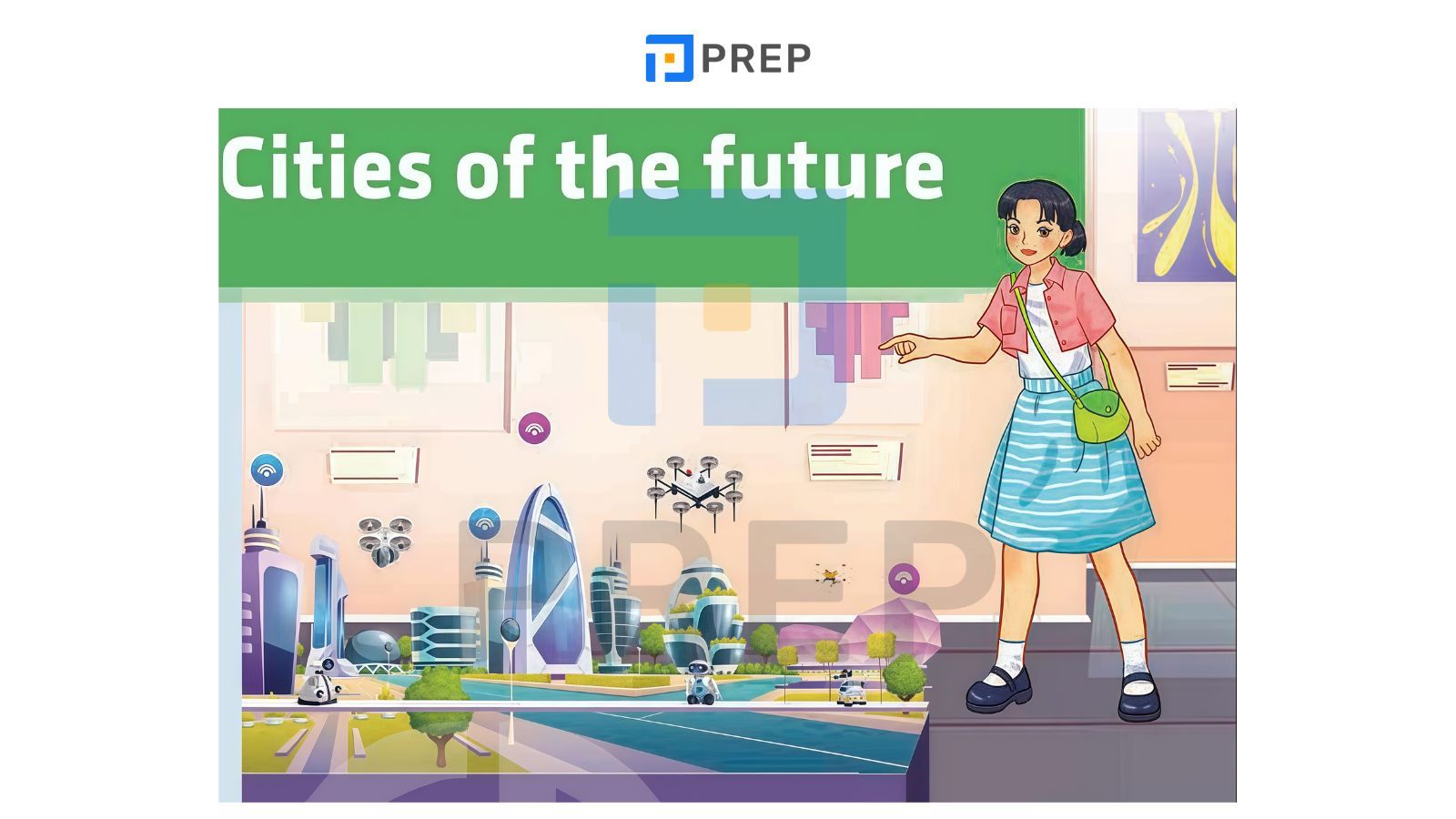
Xem chi tiết phần dịch nghĩa và đáp án bài nghe tại: Tiếng Anh 11 Unit 3 Listening.
4. Unit 4 - ASEAN and Viet Nam
Bài nghe Unit 4 là một trong các bài nghe tiếng Anh lớp 11 giúp bạn có cơ hội hiểu biết thêm về các quốc gia khác. Chủ đề của nó là về cuộc trò chuyện giữa hai học sinh đang lên kế hoạch chuẩn bị cho một chương trình giao lưu trường học trong khối ASEAN.
Audio Transcript:
Lan: Hi Phong. Did you hear the news? A group of foreign students are coming to visit our school. I wonder if their visit is part of the ASEAN School Tour Programme that our teacher mentioned yesterday.
Phong: Yes, it is. I'm working with other members of the school's Youth Union to prepare a special event to welcome them.
Lan: When are they coming?
Phong: On the 5th of May. They'll spend one day at our school during their five-day tour in Viet Nam. After that, they'll go to Indonesia.
Lan: How many students are there in the group?
Phong: As far as I know, there'll be about thirteen students from Korea and other ASEAN countries. This will definitely be a great opportunity for us to make friends with them, and learn about their culture.
Lan: Exactly. It's also a great way for us to learn more about Korea, and ASEAN members.
Phong: We also plan on having discussions about how young people in the region can help build an ASEAN community.
Lan: I have a suggestion. Why don't you ask all the students from our school to come up with ideas for activities during the group's visit? This way, everyone will be keener to take part in the event.
Phong: Sounds great, Lan. I'll post a call for ideas on our Youth Union webpage. I hope many students will be interested in contributing to the event.
Lan: OK, I'll look out for the post. I already have some ideas for activities.
Xem chi tiết phần dịch nghĩa và đáp án bài nghe tại: Tiếng Anh 11 Unit 4 Listening.
5. Unit 5 - Global Warming
Trong phần Listening của Unit 5 tiếng Anh lớp 11, bạn sẽ nghe một bài thuyết trình chuyên sâu về carbon đen và ảnh hưởng của nó đối với nhiệt độ toàn cầu, từ đó luyện khả năng nghe hiểu chi tiết và học thuật.
Audio Transcript:
Hi everyone. Thanks for offering me the opportunity to talk about black carbon.
Black carbon, also known as soot, consists of tiny pieces of black dust. It mainly comes from forest fires and the burning of fossil fuels and crop waste. We now know that it plays a much bigger role in global warming than previously thought. Let me first talk more about the burning of crop waste. Do you know why farmers do that? Well, they believe that burning is the best way to clear land and prepare it for new crops. However, these huge fires are the world's biggest source of soot. In addition, burning crop waste is bad for the soil because it kills the useful organisms living in it. But how long does black carbon stay in the atmosphere? Actually, it only lasts for a few days or weeks after it is released. However, its effect on the earth's temperature is more powerful than that of carbon dioxide. Black carbon traps more sunlight and sends it back into the air as heat. In addition, when black carbon falls onto ice or snow, it warms the surface and increases the speed of melting.
So what do you think we should do to...
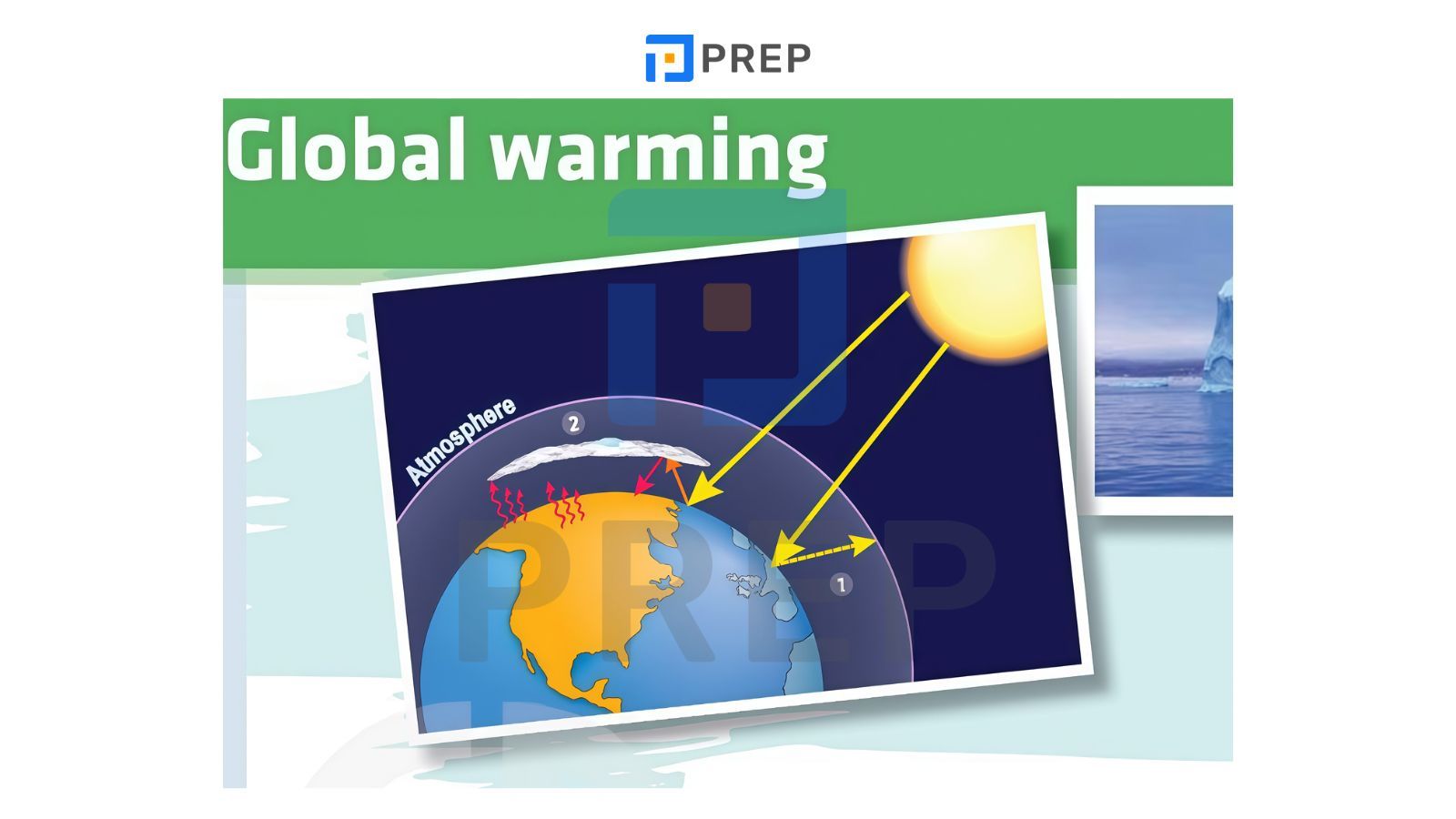
Xem chi tiết phần dịch nghĩa và đáp án bài nghe tại: Tiếng Anh 11 Unit 5 Listening.
6. Unit 6 - Preserving Our Heritage
Bài nghe trong Unit 6 môn tiếng Anh lớp 11 là lời giới thiệu của hướng dẫn viên du lịch về Quần thể Tràng An, giúp bạn rèn luyện khả năng nghe chi tiết và ghi chép ý chính.
Audio Transcript:
Hello everyone. Welcome to Trang An Scenic Landscape Complex. My name is Thanh and I'm your guide for this tour.
First, let me give you some quick facts. Trang An became the first site in Viet Nam to be recognized by UNESCO as a mixed World Heritage Site in 2014. It's famous for its beautiful landscape and long cultural history. The site consists of three protected areas: the Hoa Lu Ancient Capital, the Trang An-Tam Coc-Bich Dong Scenic Area, and the Hoa Lu Special-Use Primary Forest. These areas are linked together by limestone mountains, valleys, and rivers. Trang An ecosystem has more than 600 types of plants and 200 types of animals.
Trang An is also a place where nature meets culture. Evidence from the caves that we'll visit today shows how early humans interacted with the natural environment to deal with climate change over a period of 30,000 years. The site also contains hundreds of temples and historic pagodas dating from different historical periods.
As you'll see, the site is a place of natural beauty and wild scenery that has not been changed or damaged by human activities. There is a long history of protection of the area and most of the site is still in its natural state. For example, the architecture of the pagodas and temples is kept in its original style. Any work to preserve, protect, and promote the area is planned carefully.
Now, we'll start our tour with…
Xem chi tiết phần dịch nghĩa và đáp án bài nghe tại: Tiếng Anh 11 Unit 6 Listening.
7. Unit 7 - Education options for school-leavers
Luyện nghe tiếng anh 11 Unit 7 với chủ đề hội thoại giữa Mai và một tư vấn viên tại Trường Dạy nghề ABC, giúp bạn phát triển khả năng nghe hiểu thông tin cụ thể liên quan đến chương trình học.
Audio Transcript:
Lan: Good morning.
Receptionist: Good morning. Welcome to ABC Vocational School. How can I help you?
Lan: I watched a TV programme about your school last week. I'd like to ask for information about your courses.
Receptionist: Sure. What's your name, please?
Lan: I'm Nguyen Thanh Lan
Receptionist: OK, Lan. We offer a wide range of courses including tour guide training, hotel and restaurant management, and cooking. Are you interested in a specific trade?
Lan: Yes, I'd like to know more about your cooking courses. How long does it take to complete a cooking course?
Receptionist: Well, it depends. We have short cooking courses for all ages and abilities. They are usually two to three months, and mainly for people who want to learn about food preparation and have fun in the kitchen. We also have professional cooking courses, which take two years to complete, for those who want to train to be restaurant cooks.
Lan: Do you offer any apprenticeships?
Receptionist: Yes, once you join a course, you'll have the opportunity to work as an apprentice in a real restaurant and learn from the best chefs.
Lan: That's amazing!
Receptionist: Would you like to fill in the application form?
Lan: Oh, I'm only in grade 11.I haven't discussed my plans with my parents either.
Receptionist: OK, no problem. Please take a copy of our school brochure. It has detailed information about all the courses.
Lan: Thank you so much. Goodbye.
Receptionist: Bye, Lan. Good luck.
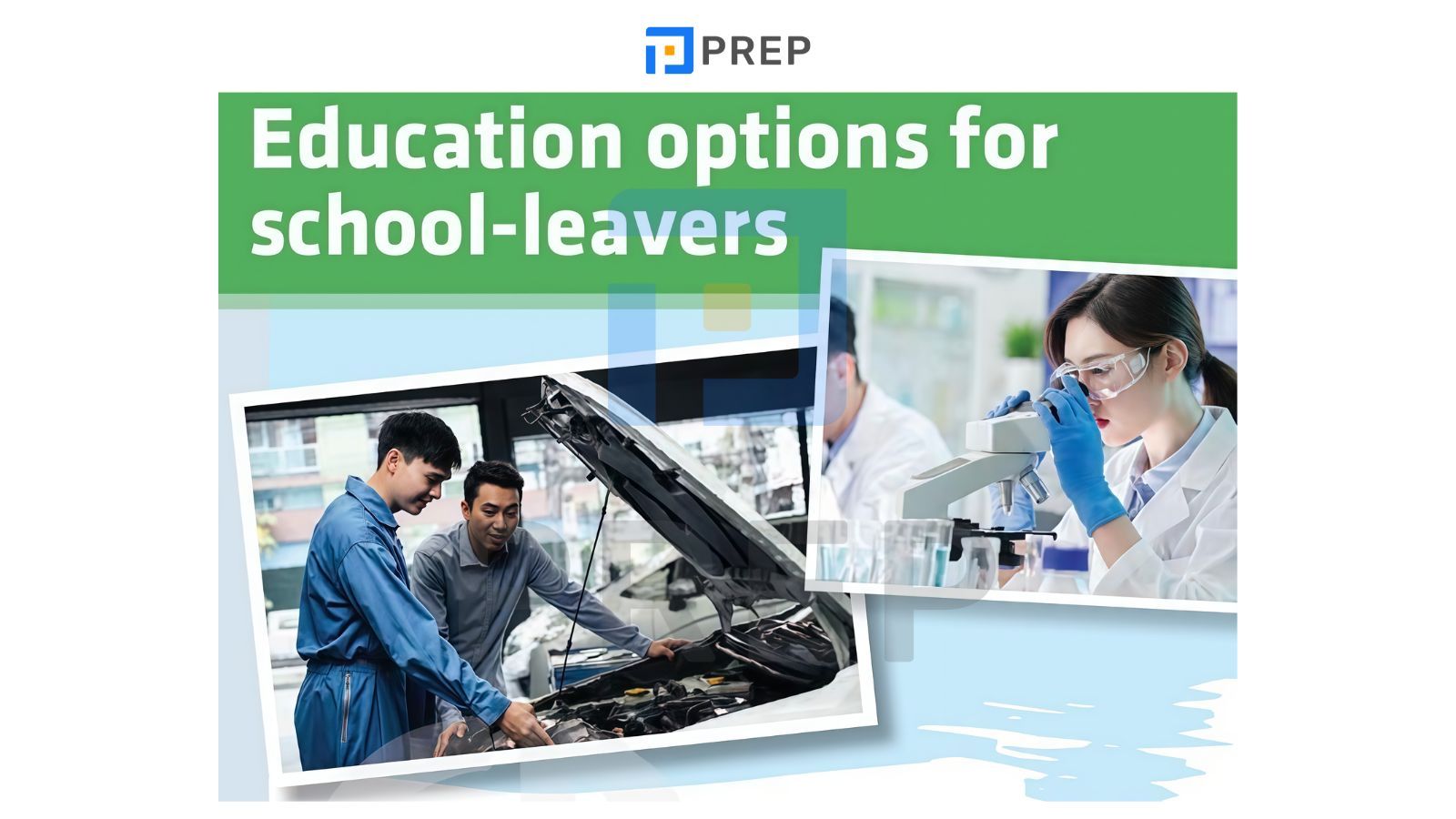
Xem chi tiết phần dịch nghĩa và đáp án bài nghe tại: Tiếng Anh 11 Unit 7 Listening.
8. Unit 8 - Becoming Independent
Một trong những bài nghe tiếng Anh lớp 11 mà rất thiết thực với các học sinh đó là Unit 8 lớp 11 - một cuộc hội thoại thú vị về những người học tự lập (Independent Learners), giúp bạn rèn luyện kỹ năng nghe hiểu và nắm bắt các đặc điểm của họ.
Audio Transcript:
Mai: Mike, our teacher mentioned that university students are expected to be independent learners. How do you think we can become independent learners?
Mike: That's an interesting question. Look, this website has information about it. It says independent learners have four main characteristics.
Mai: So what are they?
Mike: Firstly, they're self-motivated. They enjoy learning new things. No one has to force them to study. They never wait for their parents or teachers to help them or tell them what to do.
Mai: I agree. It's the motivation for learning that makes people study hard.
Mike: Secondly, independent learners are responsible. They take responsibility for their own learning
Mai: Are there any examples?
Mike: Yes, they set their own learning goals and make detailed study plans to achieve them. These study plans should also include time to relax and enjoy a good night's sleep.
Mai: I see.
Mike: Thirdly, they never give up. Once they start working on a task, they try very hard to complete it.
Mai: I definitely agree.
Mike: Finally, they're curious. They want to know more about the world. They're not afraid of asking difficult questions, but they also try to find the answers themselves.
Mai: I couldn't agree more. I hope I can try to become an independent learner.
Xem chi tiết phần dịch nghĩa và đáp án bài nghe tại: Tiếng Anh 11 Unit 8 Listening.
9. Unit 9 - Social issues
Bài Speaking trong Unit 9 môn tiếng Anh lớp 11 giúp bạn luyện tập trao đổi và phản hồi các tình huống gắn với áp lực đồng trang lứa, qua đó rèn luyện kỹ năng giao tiếp thiết yếu.
Audio Transcript:
Mai: So at our club meeting last time, we decided to plan our campaign around bullying among teenagers. We also thought that it'd be useful to do some research on the topic before this meeting. So what have you found out, Mark?
Mark: Well I've learned that there are three main types of bullying-physical, verbal, and social bullying.
Mai: I guess physical bullying involves violent behaviour such as hitting, kicking, or pushing people.
Mark: That's right. And verbal bullying means using words to attack others, such as shouting at, or saying something offensive to them.
Mai: What about social bullying?
Mark: Well, it happens when people keep telling lies or bad things about someone behind their back, or making them feel ashamed in public.
Mai: That's very mean. As we use more technology, bullying is also becoming more common on social media.
Mark: That's cyberbullying, which takes place over digital devices such as mobile phones and computers. People sometimes tell lies or post offensive comments about someone else on social media.
Mai: My friend was the victim of cyberbullying. Some people kept posting very rude comments about her weight on social media. She became very upset and cried a lot.
Mark: I'm sorry about your friend. Body shaming is now one of the most common forms of cyberbullying.
Mai: I agree. So let's meet next week and start planning our campaign.
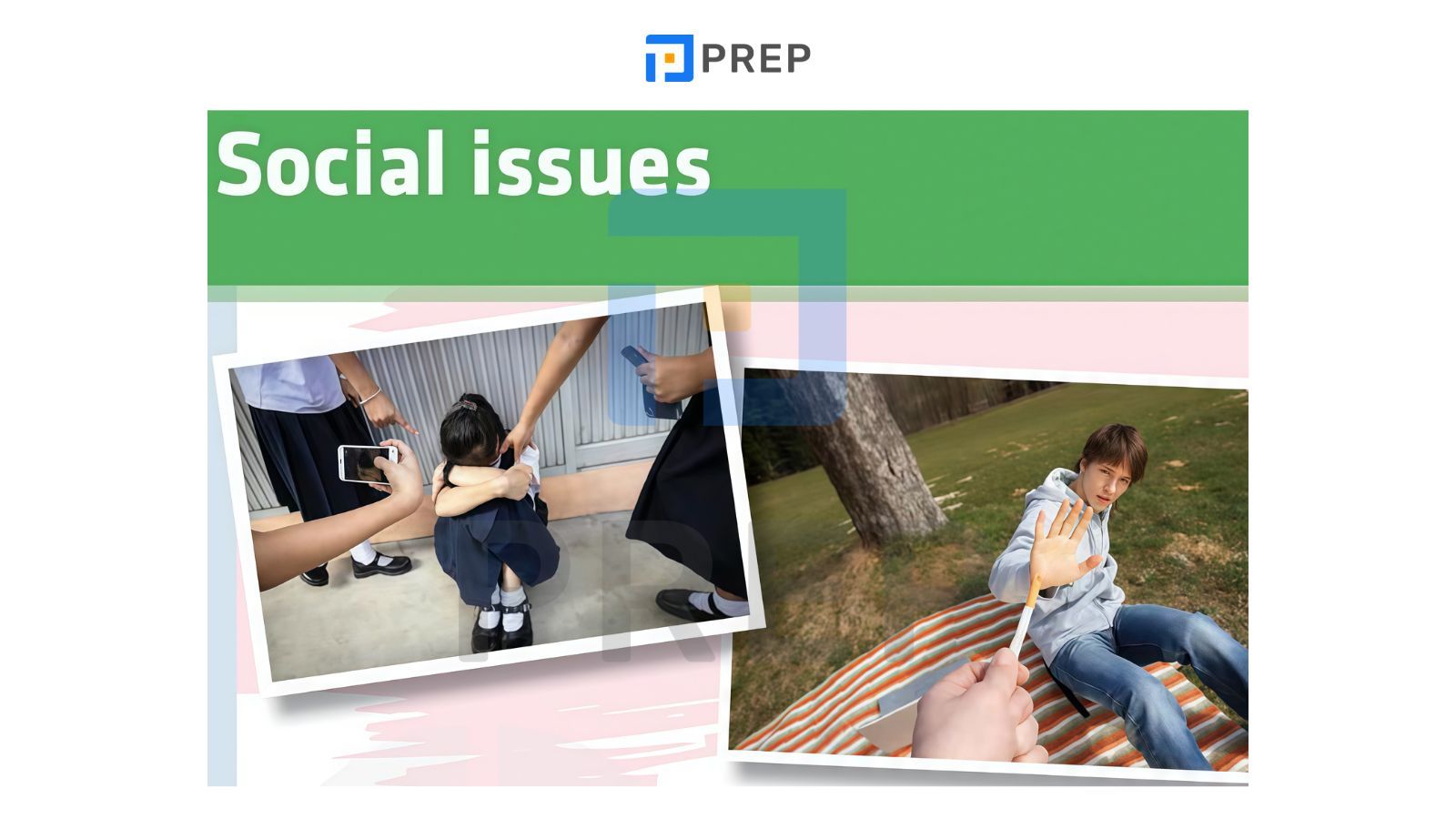
Xem chi tiết phần dịch nghĩa và đáp án bài nghe tại: Tiếng Anh 11 Unit 9 Listening.
10. Unit 10 - The ecosystem
Audio Transcript:
Nam: Good morning. I'd like to introduce Dr Steve Logan - an environmental expert with a lot of experience in biodiversity conservation. He’ll talk about the importance of ecosystems at our environmental club meeting. Please welcome, Dr. Logan.
Mr. Logan: Thank you, Nam. As you know, an ecosystem includes living and non-living things, and each of them plays an important role. A healthy ecosystem brings many benefits, such as cleaning our air and water, providing food and controlling climate change. But human activities are damaging our planet's biodiversity. Half of our coral reefs have disappeared and it's believed that 90% of the world coral reefs will die by 2050 due to warming oceans and pollution. We've cut down one third of the world's forests to make space for farming or houses. As a result, many animals and plants have lost their habitats, and many species are disappearing.
Nam: So people are destroying the balance of local ecosystems, aren't they? But this in turn will affect human life.
Mr. Logan: That's right. One day we may not have fresh air to breathe or water to use. This may happen if we damage the fine balance among all living and non-living things in the ecosystems. As species disappear, the food chain may break down. We may run out of food, suffer from health problems, and face more natural disasters. So what can we do to restore ecosystems?
Xem chi tiết phần dịch nghĩa và đáp án bài nghe tại: Tiếng Anh 11 Unit 10.
11. Review 1, 2, 3, 4
Cùng PREP luyện tập lại các bài nghe tiếng anh lớp 11 của 4 phần Review 1, 2, 3, 4 ngay sau đây nhé!
11.1. Review 1
Audio Transcript:
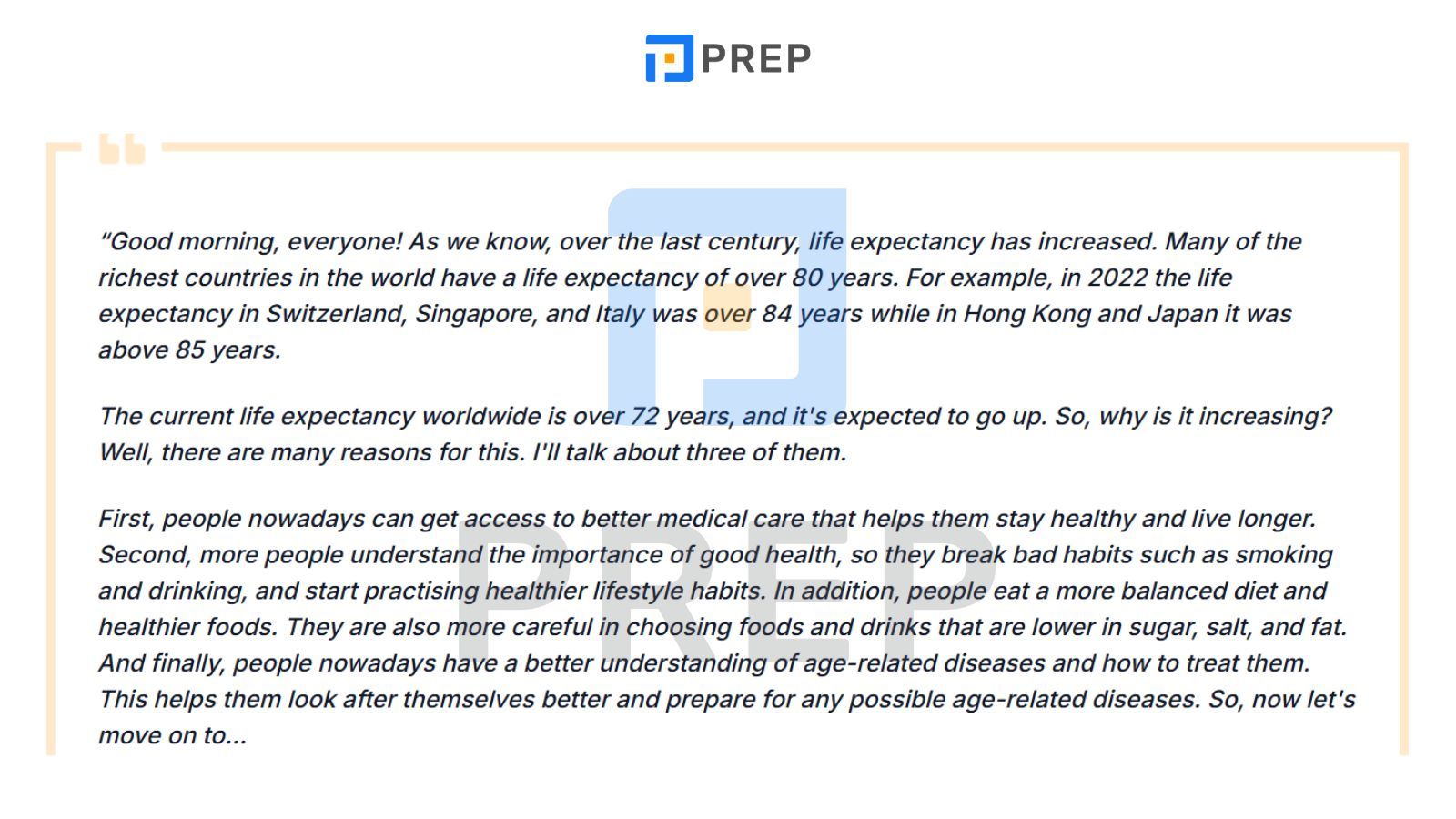
Xem bài tập và đáp án chi tiết cho bài nghe tại: Tiếng Anh 11 Review 1.
11.2. Review 2
Bài nghe của Review 2 sẽ liên quan đến chủ đề Global Warming.
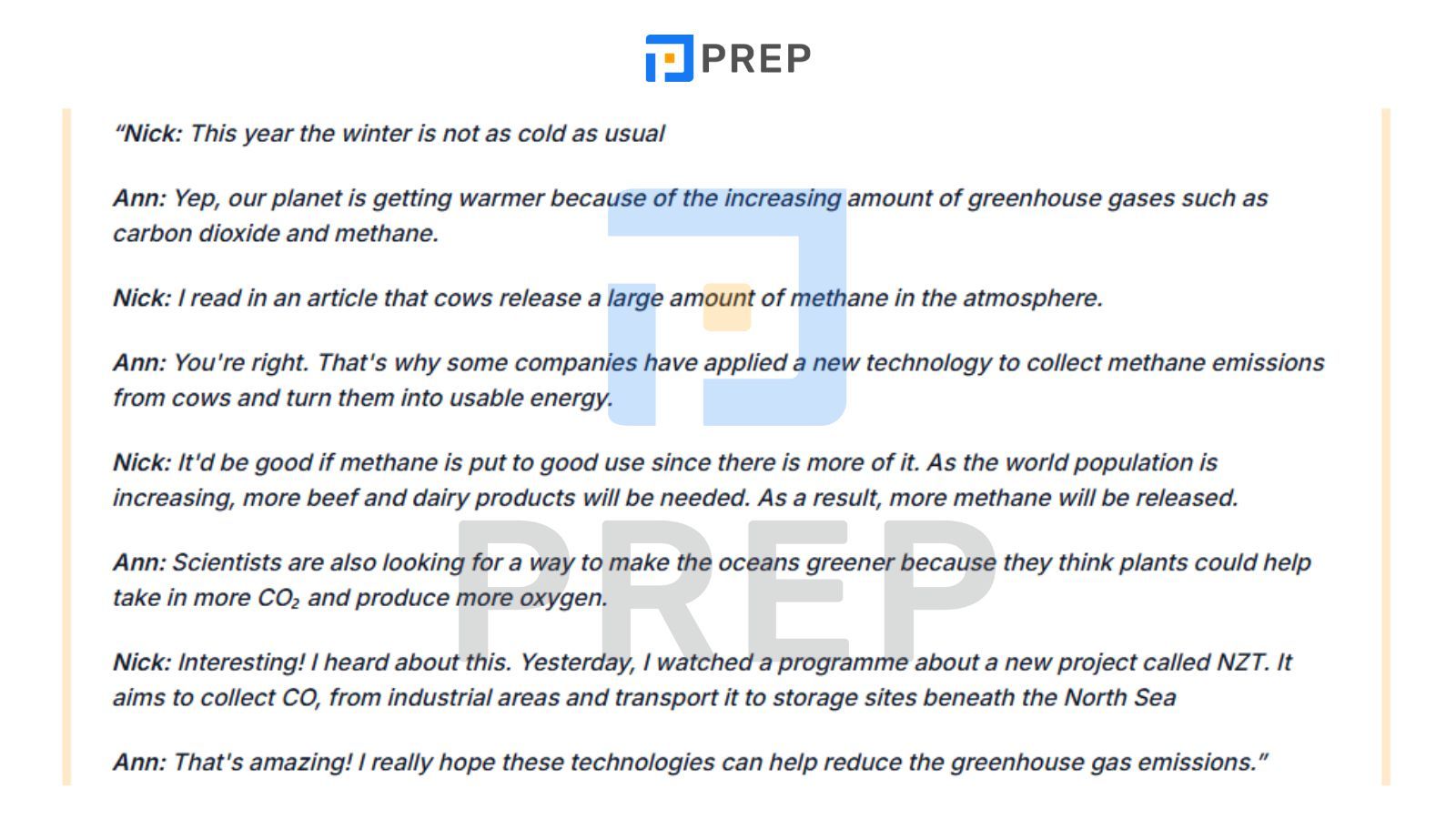
Tham khảo bài tập và đáp án chi tiết cho Review 3 tại: Tiếng Anh 11 trang 62 - 65 (Review 2).
11.3. Review 3
Audio transcript:
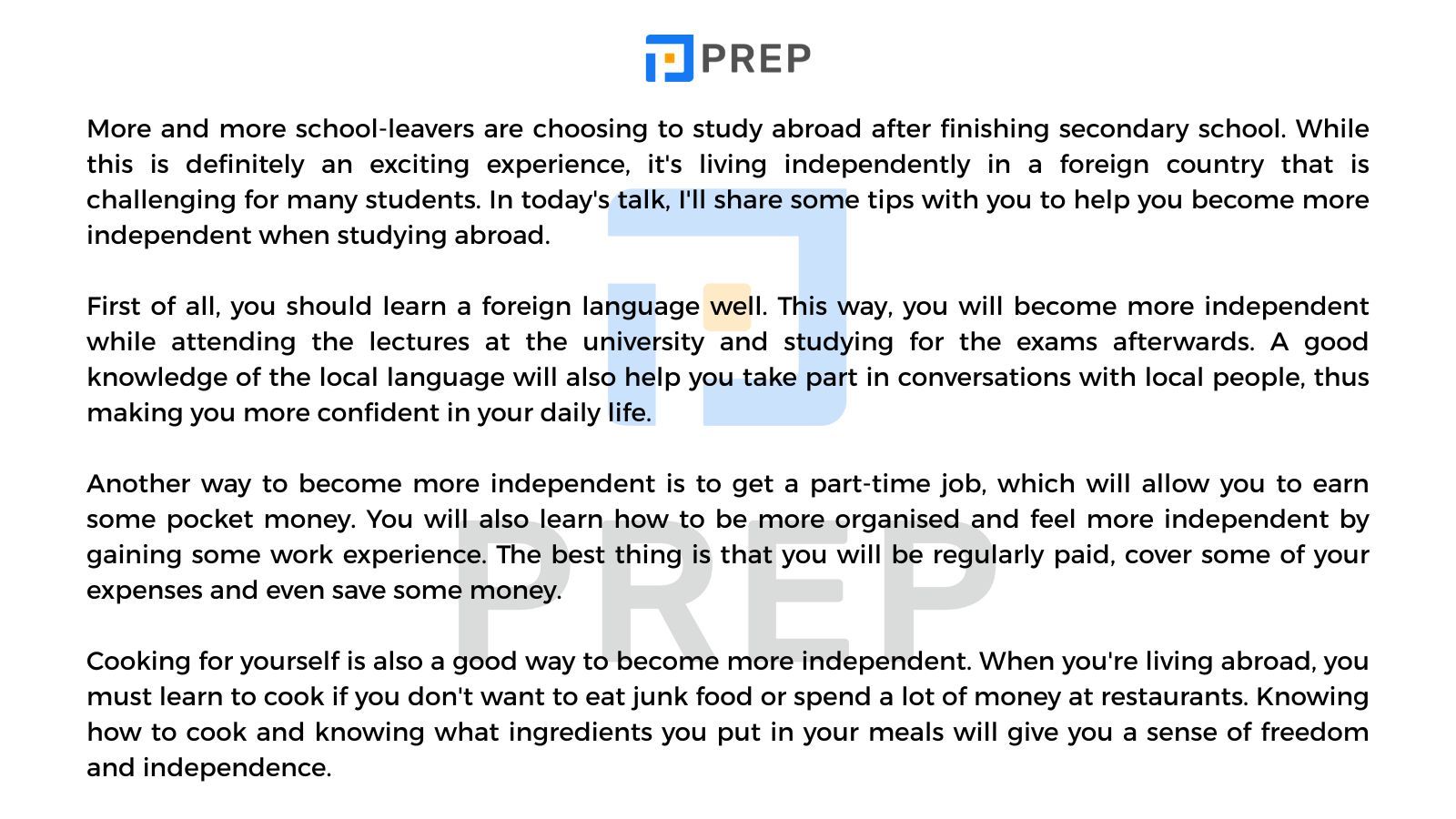
Xem dịch nghĩa và lời giải chi tiết tại: Tiếng Anh 11 Review 3.
11.4. Review 4
Chủ đề của Review 4 sẽ liên quan đến Unit 9 - Social Issues.
Khi luyện tập phần nghe, bạn cũng cần ôn lại các từ vựng hay ngữ pháp theo từng Unit. PREP đã hỗ trợ bạn bằng việc hệ thống hóa kiến thức tại các bài viết dưới đây:
-
Tổng hợp từ vựng tiếng Anh lớp 11 cả năm chương trình SGK mới kèm bài tập
-
Tổng hợp đầy đủ kiến thức ngữ pháp tiếng Anh lớp 11 Global Success
II. Bài tập nghe tiếng Anh lớp 11 kèm đáp án
Bên cạnh các bài nghe mà chương trình Global Success cung cấp, PREP cũng đã biên soạn các bài nghe tiếng Anh lớp 11 kèm bài tập chất lượng, giúp bạn nâng cao kỹ năng của mình!
1. Bài 1
Part 1: Choose the best answer (A, B, C, or D).
-
What is the main topic of the talk?
A. The importance of genetics in aging.
B. A comparison of different gyms around the world.
C. Lifestyle factors that contribute to a long life.
D. The history of the "Blue Zones." -
According to the speaker, what is a key feature of the diet in Blue Zones?
A. It is high in meat and protein.
B. It consists mainly of plant-based foods.
C. It avoids all grains and beans.
D. It includes a lot of dairy products.
Part 2: Fill in the blanks with ONE word from the recording.
-
The daily lives of people in Blue Zones are filled with natural __________.
-
In Okinawa, having a sense of purpose is called "__________".
-
Strong social __________ provide an essential support system for people in these regions.
Answer Key:
-
C | 2. B | 3. movement | 4. ikigai | 5. connections
2. Bài 2
Questions:
Part 1: Decide if the statements are True (T) or False (F).
-
The generation gap is a completely new problem caused by the internet.
-
Dr. Hayes suggests that technology is a major reason for the widening generation gap.
-
According to Dr. Hayes, the best way to solve the problem is for younger people to adopt older values.
Part 2: Choose the best answer (A, B, or C).
-
Younger people who grew up with the internet are referred to as...
A. digital experts.
B. digital natives.
C. digital learners. -
What does Dr. Hayes say is the key to bridging the generation gap?
A. Forcing everyone to use the same technology.
B. Deciding which generation's values are correct.
C. Having respect and communicating openly.
Answer Key:
-
F | 2. T | 3. F | 4. B | 5. C
3. Bài 3
Questions:
Part 1: Fill in the blanks with ONE WORD from the recording.
-
A smart city uses technology to improve the __________ of life for its citizens.
-
Smart grids help manage energy __________ more efficiently.
-
A major challenge for smart cities is protecting data __________.
Part 2: Choose the best answer (A, B, or C).
-
What technology does the lecturer mention as being particularly important for smart cities?
A. Virtual Reality.
B. The Internet of Things (IoT).
C. Artificial Intelligence in homes. -
Which of the following is NOT mentioned as a feature of a smart city?
A. Intelligent traffic systems.
B. Optimized waste collection.
C. Free personal cars for all citizens.
Answer Key:
-
quality | 2. consumption | 3. privacy | 4. B | 5. C
4. Bài 4
Part 1: Choose the best answer (A, B, C, or D).
-
When did Viet Nam officially join ASEAN?
A. 1967
B. 1995
C. 2000
D. 1975 -
What is mentioned as a major economic benefit for Viet Nam after joining ASEAN?
A. A decrease in taxes for its citizens.
B. The creation of a new national currency.
C. Access to a large regional market and more investment.
D. The ability to leave the United Nations.
Part 2: Decide if the statements are True (T) or False (F).
-
Viet Nam was one of the founding members of ASEAN.
-
Joining ASEAN has improved Viet Nam's international diplomatic position.
-
Viet Nam has played a passive role within the ASEAN community.
Answer Key:
-
B | 2. C | 3. F | 4. T | 5. F
5. Bài 5
Questions:
Part 1: Fill in the blanks with ONE word from the recording.
-
Human activities, especially the burning of __________ fuels, have increased greenhouse gases.
-
The melting of glaciers and ice caps causes sea levels to __________.
-
Global warming is leading to more ________ weather events.
Part 2: Choose the best answer (A, B, or C).
-
What is the main function of greenhouse gases in the atmosphere?
A. To reflect all of the sun's energy back into space.
B. To trap some of the sun's energy, warming the Earth.
C. To create clouds and rain. -
What is the main solution suggested by the narrator?
A. Building higher walls along the coasts.
B. Moving all communities away from the coast.
C. Reducing emissions and using cleaner energy.
Answer Key (Unit 5):
-
fossil | 2. rise | 3. extreme | 4. B | 5. C
6. Bài 6
Questions:
Part 1: Choose the best answer (A, B, or C).
-
According to Dr. Petrova, heritage can be...
A. only tangible things like buildings.
B. only intangible things like music.
C. both tangible and intangible things. -
Which of the following is an example of intangible heritage?
A. An ancient monument.
B. Traditional music.
C. An old artifact.
Part 2: Fill in the blanks with ONE word from the recording.
-
Heritage gives us a sense of __________ and continuity.
-
Mass __________ is mentioned as one of the threats to heritage.
-
Dr. Petrova believes that local communities can be the best __________ of their heritage.
Answer Key (Unit 6):
-
C | 2. B | 3. identity | 4. tourism | 5. guardians
7. Bài 7
Questions:
Part 1: Decide if the statements are True (T) or False (F).
-
The speaker states that university is the only option for a successful future.
-
Vocational education focuses more on theory than practical skills.
-
A gap year can be a productive way to gain life experience.
Part 2: Choose the best answer (A, B, or C).
-
Which path is described as being "hands-on" and leading directly to employment?
A. University.
B. Vocational education.
C. A gap year. -
What is the final piece of advice the speaker gives?
A. To travel the world immediately after school.
B. To choose the path that your parents recommend.
C. To reflect on your personal strengths and choose the right path for yourself.
Answer Key (Unit 7):
-
F | 2. F | 3. T | 4. B | 5. C
8. Bài 8
Questions:
Part 1: Fill in the blanks with ONE word from the recording.
-
The speaker's biggest shock was taking on __________ responsibility.
-
She started using an app to __________ her spending.
-
Besides managing money, independence is also about __________ maturity.
Part 2: Choose the best answer (A, B, or C).
-
What was one of the first practical skills the speaker had to learn?
A. How to drive a car.
B. How to create a budget.
C. How to fix a computer. -
What does the speaker say about her overall experience of becoming independent?
A. It was easy and exactly as she had imagined.
B. It was a negative experience she regrets.
C. It was challenging but a valuable learning experience.
Answer Key (Unit 8):
-
financial | 2. track | 3. emotional | 4. B | 5. C
9. Bài 9
Questions:
Part 1: Decide if the statements are True (T) or False (F).
-
Food waste only occurs in supermarkets.
-
In developed nations, consumers are responsible for a large amount of food waste.
-
Food waste has no negative impact on the environment.
Part 2: Choose the best answer (A, B, or C).
-
When food waste decomposes in landfills, it produces...
A. oxygen.
B. clean water.
C. methane. -
Which of the following is suggested as a solution at the individual level?
A. Only buying food from farms.
B. Planning meals and buying only what is needed.
C. Throwing all leftovers away immediately.
Answer Key (Unit 9):
-
F | 2. T | 3. F | 4. C | 5. B
10. Bài 10
Questions:
Part 1: Fill in the blanks with ONE word from the recording.
-
Biodiversity is the __________ of life in a particular habitat.
-
A diverse ecosystem is more __________ and can adapt to change.
-
Losing too many species can cause the entire __________ to collapse.
Part 2: Choose the best answer (A, B, or C).
-
What example does the speaker use to illustrate the importance of biodiversity?
A. Predation by lions.
B. Plant pollination.
C. The water cycle. -
What is the main cause of the current rapid loss of biodiversity?
A. Natural disasters.
B. Animal diseases.
C. Human activities.
Answer Key (Unit 10):
-
variety | 2. resilient | 3. web | 4. B | 5. C
Tham khảo thêm những nguồn tài liệu và đề thi hữu ích dưới đây nhé!
Tổng hợp bài tập luyện nghe tiếng Anh theo trình độ, kỳ thi và tài liệu
Giải sách bài tập tiếng Anh 11 Global Success kèm giải thích
Tổng hợp bài tập tiếng Anh 11 chuẩn chương trình Global Success
Ôn thi tiếng Anh học kì 1 lớp 11 với đề cương chi tiết và đề ôn thi
Ôn thi tiếng Anh học kì 2 lớp 11 với đề cương chi tiết và đề ôn thi
Trắc nghiệm tiếng anh 11 theo Unit, chuyên đề ngữ pháp và đề kiểm tra
Tổng hợp 20+ đề thi giữa kì 1 tiếng Anh 11 Global Success kèm đáp án chi tiết
Thông qua tổng hợp các bài nghe tiếng Anh 11 kèm theo bài luyện tập bổ trợ, PREP mong rằng việc rèn luyện kỹ năng nghe của bạn sẽ trở nên dễ dàng, khoa học và hiệu quả hơn. Thành công luôn đến từ sự kiên trì cùng phương pháp học đúng đắn, và PREP tin rằng bộ tài liệu này sẽ là người bạn đồng hành đáng tin cậy trong hành trình chinh phục môn Tiếng Anh. Chúc bạn học tập thật tốt!
PREP mang đến giải pháp học tiếng Anh online hiệu quả với AI độc quyền. Bạn có thể tự học tại nhà với các khóa học IELTS, TOEIC, VSTEP, APTIS và tiếng Anh giao tiếp. Teacher Bee AI sẽ hỗ trợ bạn suốt quá trình học, giúp bạn nhanh chóng nâng cao kỹ năng ngôn ngữ.
Liên hệ HOTLINE 0931428899 hoặc click TẠI ĐÂY để được tư vấn chi tiết!
Tải app PREP ngay hôm nay để bắt đầu học tiếng Anh online chất lượng cao tại nhà.

Chào bạn! Mình là Hiền Hoàng, hiện đang đảm nhận vai trò quản trị nội dung sản phẩm tại Blog của website prepedu.com.
Với hơn 5 năm tự học các ngoại ngữ như tiếng Anh, tiếng Trung và ôn luyện một số kỳ thi IELTS, TOEIC, HSK, mình đã tự đúc rút được nhiều kinh nghiệm để hỗ trợ hàng nghìn người đang gặp khó khăn trong việc học ngoại ngữ. Hy vọng rằng những chia sẻ phía trên sẽ giúp ích cho bạn trong quá trình tự ôn luyện thi hiệu quả tại nhà!
Bình luận
Nội dung premium
Xem tất cảLộ trình cá nhân hoá
Có thể bạn quan tâm
Kết nối với Prep
MSDN: 0109817671.
Địa chỉ liên hệ: Tòa nhà Vinaconex, 34 Láng Hạ, phường Láng, TP Hà Nội.
Địa chỉ kinh doanh: Lô 21 C2 Khu đô thị Nam Trung Yên, phường Yên Hòa, TP Hà Nội.
Trụ sở: Số nhà 20, ngách 234/35 đường Hoàng Quốc Việt, phường Nghĩa Đô, TP Hà Nội.
Phòng luyện ảo - Trải nghiệm thực tế - Công nghệ hàng đầu.
Hotline: 0931 42 8899.
Trụ sở: Số nhà 20, ngách 234/35 đường Hoàng Quốc Việt, phường Nghĩa Đô, TP Hà Nội.
Giấy chứng nhận hoạt động đào tạo, bồi dưỡng số 1309/QĐ-SGDĐT ngày 31 tháng 07 năm 2023 do Sở Giáo dục và Đào tạo Hà Nội cấp.
